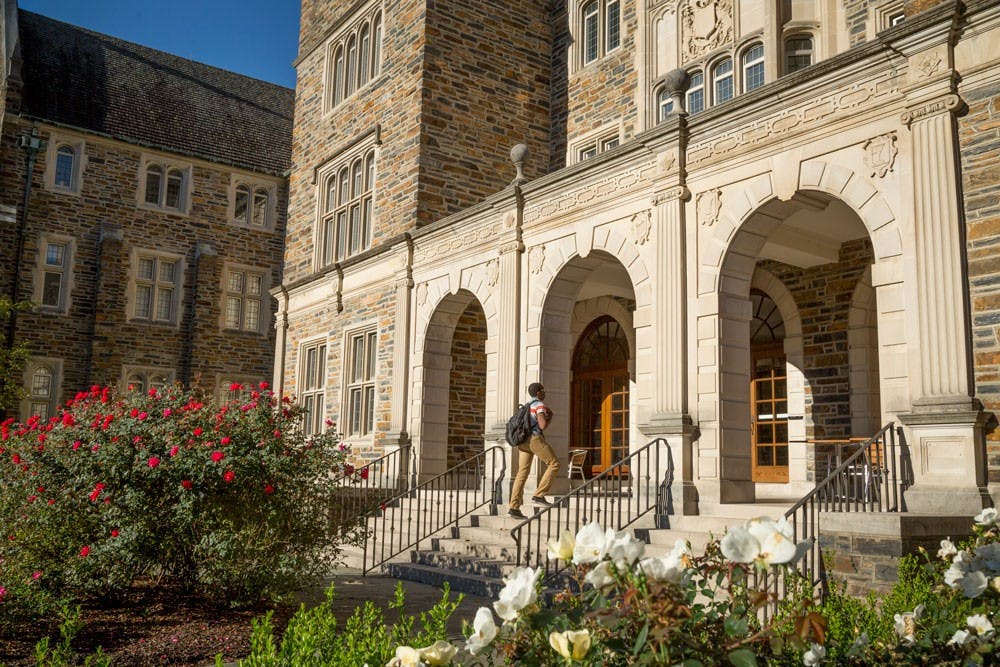Trinity College of Arts & Sciences initiated a nationally-advertised search this spring for a cluster hire in Native American and Indigenous Studies. The search is part of an ongoing effort throughout campus to hire diverse faculty, including faculty who identify as indigenous or Native American.
According to Kimberly Hewitt, vice president for institutional equity, the University received a $16 million grant from the Duke Endowment last year to recruit diverse faculty and develop programming to create an inclusive and equitable environment.
“Hiring underrepresented faculty to enhance our inclusive excellence is a strategic priority of the University,” Hewitt said.
Associate Professor of History Juliana Barr, one of the faculty involved with the cluster hire, emphasized the influence of student voices within the hiring initiative.
“It’s important to note that the effort to hire in Native American and Indigenous Studies is student-driven, with all credit due to the Native American Student Alliance,” Barr said.
Barr traces the start of the hiring effort to an op-ed in The Chronicle written in 2019 by Shandiin Herrera, Trinity ‘19, then-president of NASA.
“Since her article was published, Native alums have also organized, and they have been very supportive of NASA's efforts,” Barr said. Many Native students and alumni, along with faculty, are now working to craft a land acknowledgment for the University through the Duke Human Rights Center.
The first round of hiring for Trinity involved applicants with expertise in art, art history & visual studies; African and African American studies; biology; cultural anthropology; evolutionary anthropology; gender, sexuality and feminist studies; history; linguistics; literature; philosophy; religious studies and romance studies.
According to Barr, the search led to on-campus interviews of five finalists as decided by a college-wide Arts & Sciences search committee. Hewitt said that Duke has hired two indigenous faculty members who will join Duke over the next 12 months in Trinity and the Nicholas School of the Environment.
Ryan Emanuel, known for his innovative scholarship on water, environmental justice and Indigenous rights, will join the Nicholas School in January 2022 as an associate professor of hydrology.
The dean's office gave approval for two additional job offers. Of the two offers, Courtney Lewis accepted her offer and will be joining the Cultural Anthropology faculty in fall 2022.
“There was also a real missed opportunity in the search regarding the most senior candidate among the five finalists, Malinda Maynor Lowery,” Barr said. “The history department voted unanimously and with great enthusiasm to hire Lowery, a vote that was seconded by the [Arts & Sciences] committee, but the dean's office chose not to act on those recommendations.”
Barr described Lowery’s numerous accomplishments, such as her work as “a leading Native historian in the United States, an award-winning writer and a renowned filmmaker with extensive leadership experience as director of UNC's Center for the Study of the American South and UNC's Southern Oral History Program.” Lowery is also Lumbee, representing one of the eight Native nations in North Carolina.
“The administration's decision not to make her an offer is a real loss to Duke, and Professor Lowery has now joined the faculty at Emory University, where she will take up an endowed professorship and will help build a hub for Indigenous Studies there,” Barr said.
The dean’s office declined to comment on the basis that all hiring decisions are confidential.
Susan Alberts, chair of the department of evolutionary anthropology, said the department also participated in Duke’s efforts to hire indigenous faculty.
“Our primary motivation was to bring to Duke highly talented faculty—we know that indigenous communities include some extremely talented scholars,” Alberts said.
“Among the nearly 200 applicants that applied to the position advertised by Duke, most applicants were in the humanities or social sciences, but seven were potential evolutionary anthropology department faculty,” Alberts said.
The department was able to extend an offer to one of the candidates. However, due to family considerations, the candidate was unable to take the position.
“We remain excited about the search, which is ongoing as I understand it,” Alberts said. “We hope to continue to participate.”
Get The Chronicle straight to your inbox
Sign up for our weekly newsletter. Cancel at any time.
“Note the emphasis on the word ‘Studies’ [in ‘Native American and Indigenous Studies’]: we seek faculty members with expertise in this area, not faculty who represent a specific racial or ethnic group,” wrote Kevin Moore, vice dean for faculty affairs, in an email to The Chronicle.
According to Moore, Trinity College plans to post another advertisement through Academic Jobs Online this coming fall to initiate a second round of hiring in Native American and Indigenous Studies. Trinity College has also recently initiated cluster searches in Contemporary Africa, Latinx Studies and Asian American Studies. The first two are expected to conclude in the coming academic year.

